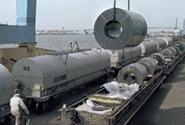Market Data

March 31, 2014
Barge Shipping Experiencing Delays in Upper Mississippi
Written by Sandy Williams
Barge shipping is beginning to accelerate as winter ice melts on US waterways. The MID-SHIP Report says navigation has resumed on the Illinois River and the middle section of the Upper Mississippi, north to Clinton, Iowa. The Upper Mississippi is still ice covered and chunks of ice on both rivers are slowing barge transit. The South Chicago River is 50 percent covered by ice ranging between 6” to 8” thick. MID-SHIP warns that melting snow and ice will create navigational challenges due to high waters, fast currents and flooding.
Railway transit suffered delays during the particularly severe winter weather this year and has resulted in congestion at East Coast coal export terminals.
Truck freight is backing up due to weather related backlogs, increasing demand, and driver shortage, causing difficulty for producers to secure truck capacity. MID-SHIP reports that freight rates are increasing across the board with East Coast rates nearly 20 percent higher than previous market levels. Diesel fuel has dropped three of the past four weeks but remains higher than the January 27 price of $3.905/gallon. As of March 26, diesel fuel was at $3.988/gallon.
Seaborne Shipping
In the seaborne shipping, the Capesize market is watching the drop in iron ore prices coming in tandem with increases in iron ore production by Australian miners. Seaborne iron ore trade to China is expected to near 900 million tons in 2014, with cheaper international prices expected to displace domestic Chinese ore.
The Panamax market continues to decline with the Pacific basin trading 3 times over the Atlantic. The Supramax market average time charters picked up somewhat according to the March 26 MID-SHIP Report. Supramax rates from the US Gulf to the Continent/Med are in the mid teen levels with the Med declining from $18,494 to $15,650 in the latest report.








